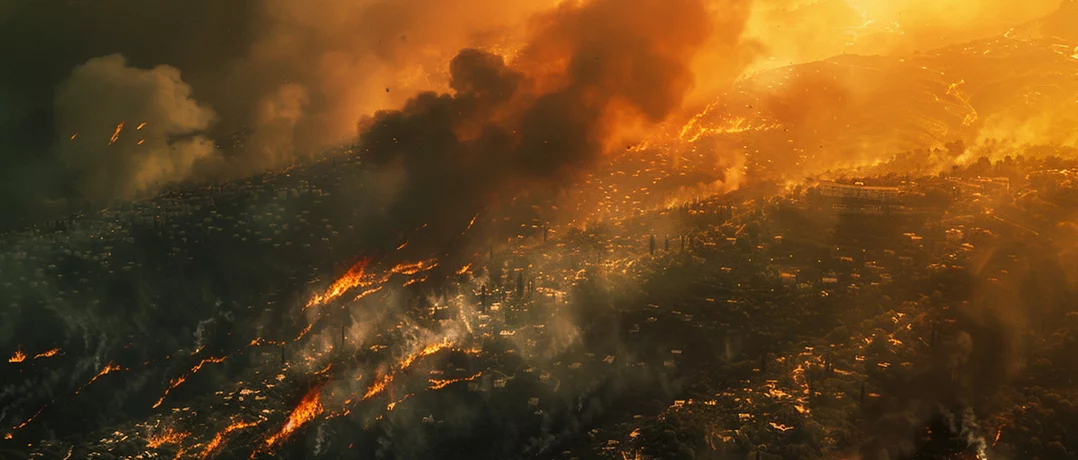Lebanon faces widespread forest and agricultural fires amid Israeli strikes, extreme heat, and strong winds.
Lebanon grapples with widespread fires

In southern Lebanon, Civil Defense teams successfully extinguished major blazes in the Rayhan and Qotrani mountains, caused by Israeli bombardments, as well as another fire in Chaara in the Baalbek district.
In Jezzine governorate, crews brought fires under control in Qnane, Jarmaq, Ayshiyeh, and Homsiyeh. Flames spread toward the forests of Bkassine and Aaray, where army helicopters assisted in controlling the blaze.
Rescue operations were also deployed to contain a large fire spreading across Deniyeh , Chhim, Mtelleh, Jaliliyeh, Daria, Zaarouriyeh, and Hasrout in the Iqlim al-Kharroub region of Chouf district.
In Mount Lebanon, extensive fires spread across the outskirts of Matla, Jaliliyeh, Telah Hasrout, and Zaarouriyeh in Iqlim al-Kharroub, Chbeniyeh, driven by strong winds.
Firefighting units, local residents, and army helicopters successfully extinguished fires in Bkassine, Bnawati, and Al-Ghabatiya, which had spread toward Aaray in Jezzine, destroying many Stone Pines, olive trees, and vineyards.
In Mount Lebanon’s Iqlim al-Kharroub, fires spread widely across Matla, Jaliliyeh, Telah Hasrout, and Zaarouriyeh, driven by strong winds. Civil Defense units from multiple regions arrived to assist in containing the flames. Residents called on firefighters and the army to protect the Al-Arid neighborhood in Zaarouriyeh.
Meanwhile, in Shadra, Akkar, fires broke out in rugged areas difficult to access. Strong eastern winds rapidly expanded the fires, threatening nearby forests and homes. Civil Defense personnel from multiple Akkar centers worked to contain the fire from the east, extending more than 1,200 meters of hoses to reach key ignition points.
Government response and oversight
The Lebanese Presidency tweeted that President Joseph Aoun, monitoring the fires, “has issued directives to the Civil Defense to combat the blazes and asked the Lebanese Army to deploy aerial assets to prevent further spread, while ensuring the needs of affected residents are met.” At the same time, Speaker of Parliament Nabih Berri has been closely following the environmental catastrophe. He directed Civil Defense units, including volunteers from the Islamic Scout Association, to mobilize all available firefighting resources and personnel in coordination with municipal councils, with a special focus on Bkassine and Chouf.
Environment Minister Tamara El-Zein visited the fire-stricken areas in Iqlim al-Kharroub, starting in Matrad, Daraya, to assess the situation of residents threatened by the massive fires. She met with Civil Defense personnel who participated in extinguishing fires in Daraya, Matla, Jaliliyeh, and Zaarouriyeh, commending their efforts and emphasizing the need to strengthen Civil Defense capabilities. She also visited Telah Hasrout and the fire sites in Matla and Jaliliyeh, expressing sorrow over the environmental damage and urging measures to prevent future incidents amid Lebanon’s challenging circumstances.
El-Zein reiterated on Tuesday,
The enemy has burned more than 8,700 hectares of agricultural and forest land. Yesterday, it continued its environmental crime by dropping incendiary objects in several forests, exacerbating the disaster.
Former Environment Minister Nasser Yassin shared images of fires consuming Shadra in Akkar, remarking, “The nation is burning. In the south due to ongoing attacks, in the north and mountains due to negligence or possibly deliberate acts. Despite this, thanks and appreciation go to the men and women of Civil Defense, first responders, municipalities, and especially the Lebanese Army Air Force for their courage and dedication, despite limited resources.”
The Civil Defense has urged citizens to exercise caution, avoid lighting fires in dry grass, and immediately report any blaze by calling 125.
From the mountains of Baalbek to the forests of Bkassine, Lebanon is facing a wave of devastating wildfires. Triggered by a dangerous mix of extreme heat, dry winds, and Israeli airstrikes in the south, these blazes have rapidly spread across multiple regions, consuming forests, olive groves, and vineyards, and putting communities on high alert. Civil Defense teams, backed by army helicopters, are racing against time to contain the flames before more damage is done.



